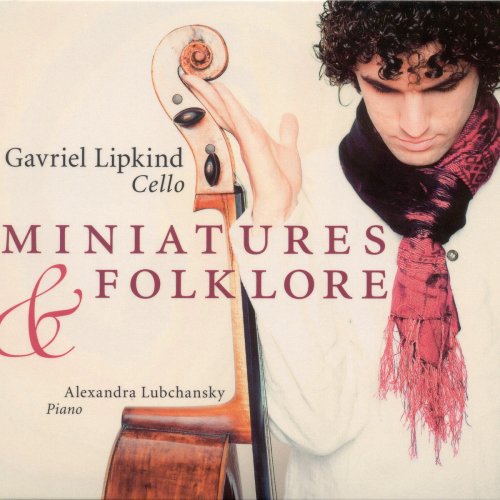
Gavriel Lipkind - Miniatures & Folklore (2006)
BAND/ARTIST: Gavriel Lipkind
- Title: Miniatures & Folklore
- Year Of Release: 2006
- Label: Berlin Classics
- Genre: Classical
- Quality: FLAC (tracks+booklet)
- Total Time: 77:04 min
- Total Size: 337 MB
- WebSite: Album Preview
Tracklist:
01. Guitarre op. 45 Nr. 2
02. Scherzo-Tarantella op. 16
03. Tango
04. Hora staccato
05. Ricercare Nr. 5
06. Tartar dance op. 84 Nr. 2
07. Waltz op. 65
08. Arabic melody
09. Lively (für Violoncello solo)
10. Romance
11. Oriental dance
12. Chonguri
13. Nr. 2: (keine Angaben)
14. Dance of the elves op. 39
15. Allegretto moderato (für 2 Violoncelli)
16. Lullaby
17. Etüde Nr. 7 (für Violoncello solo)
18. The white little donkey
19. Intermezzo e danza finale
20. Prayer
21. Cprice für Violoncello solo Nr. 5
22. Ungarischer Tanz Nr. 1 (für Violoncello und Klavier)
23. Chinese tampbourin
01. Guitarre op. 45 Nr. 2
02. Scherzo-Tarantella op. 16
03. Tango
04. Hora staccato
05. Ricercare Nr. 5
06. Tartar dance op. 84 Nr. 2
07. Waltz op. 65
08. Arabic melody
09. Lively (für Violoncello solo)
10. Romance
11. Oriental dance
12. Chonguri
13. Nr. 2: (keine Angaben)
14. Dance of the elves op. 39
15. Allegretto moderato (für 2 Violoncelli)
16. Lullaby
17. Etüde Nr. 7 (für Violoncello solo)
18. The white little donkey
19. Intermezzo e danza finale
20. Prayer
21. Cprice für Violoncello solo Nr. 5
22. Ungarischer Tanz Nr. 1 (für Violoncello und Klavier)
23. Chinese tampbourin
This disc by the young Israeli-American cellist Gavriel Lipkind and Russian-born pianist (and elsewhere singer) Alexandra Lubchansky isn't quite an original -- in the 1950s it would have been called an album of encores. Lipkind offers 23 short pieces, some exotic in flavor, some humorous virtuoso showpieces (like Ibert's The White Little Donkey, track 19), some just bits of melody. Before World War II, Lipkind points out, the music wouldn't even have been relegated to encore status -- an instrumental recital would often have consisted of a large work in the first half, followed by a lighter second half with short pieces like the ones heard here. (The shift to programs that were weightier throughout he partly attributes to the influence of Artur Schnabel.) Lipkind, then, sets out to evoke a sequence of shorter works that might have been played by Fritz Kreisler, or Jascha Heifetz, or, more rarely, a cellist such as Pablo Casals or Gregor Piatigorsky. He uses his own arrangements, in a few cases reworking existing arrangements by Kreisler and others. The results are both entertaining and edifying. The most intriguing pieces are the ethnic portraits, and it is precisely these that have long been out of fashion as audiences and musicians have pursued the grail of authenticity. Of course Glazunov's Arabic Melody and Tcherepnin's Tartar Dance are not accurate representations of the traditions they depict, but they offer fascinating insights into what Russians at the turn of the century heard in the musics from the lands to their south. The program is spiced with both earlier folkloric pieces (Brahms' Hungarian Dance No. 1) and later ones such as Georgian composer Sulkhan Tsintsadze's Chonguri. Interspersed among these are almost-forgotten crowd-pleasers like Wieniawski's Scherzo-Tarantella, Op. 16 and the venerable Hora Staccato of Grigoras Dinicu, along with melodic pieces from Fauré and Mendelssohn and special-effects extravaganzas like Moskowski's Guitarre and David Popper's Elfentanz. It's all an absolute delight; Lipkind has not only the chops but also the flair to bring the program off, and he realized that underneath the music's sensuous appeals lay a deeper engagement with folklore and with the Orient, broadly considered. He implies that the revival of this repertory can help restore classical music's appeal to a diverse audience of all ages. "Now, here we are in the 21st century," he writes. "Everyone talks about 'sound bites,' and '15 minutes of fame.' Everyone talks about the graying of the classical music audience. Everyone talks about diversity and the many cultures of the world. What is the answer? I think you have found part of it." Put his program together with an appealing hardbound booklet that shows what an ambitious designer can do with the help of computer technology, and it's hard to argue with his claim.
As a ISRA.CLOUD's PREMIUM member you will have the following benefits:
- Unlimited high speed downloads
- Download directly without waiting time
- Unlimited parallel downloads
- Support for download accelerators
- No advertising
- Resume broken downloads


